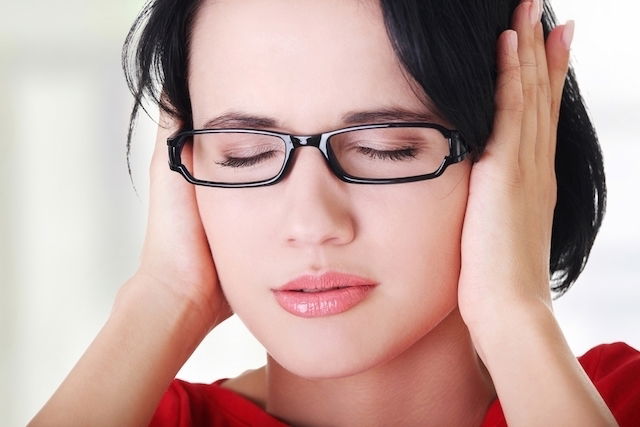Headaches are a relatively common problem that can often be relieved with simple methods like applying a cold compress on the forehead or drinking ginger tea. Headaches that are caused by stress, poor diet, fatigue or anxiety are particularly responsive to simple interventions.
Most of the time, headaches will resolve with resolve with simple methods. However, if they are persistent, do not resolve over time or if they are accompanied by other symptoms like fever, malaise, vomiting or excessive fatigue, you should seek medical attention. The doctor may order testing to identify the origin of the headache and will formulate an appropriate treatment plan based on the results.
Some tips to help relieve headaches without medication include:


1. Apply a warm or cold compress
Depending on the cause of the headache, using a cold or warm compress may be beneficial in treating pain. A compress should be placed either where the pain is felt, on the back of the neck, or on the forehead for about 10 to 20 minutes.
A cold compress is usually indicated for headaches that resemble migraines. These headaches are persistent and can be accompanied by other symptoms. An ice cold compress can help to constrict blood vessels in the head and reduce blood flow to the affected area, which can reduce pain.
On the other hand, warm compresses are indicated when the headache is tension-related or triggered by stress. In this case, in addition to applying a warm compress, you should also take a warm bath. This will help to dilate blood vessels and relax the body as a whole, which can help to reduce pain in the moment.
It is important to know the cause of your headache so that you can determine whether to use a cold or warm compress.
2. Drink coffee
A cup of black coffee can also help to naturally combat a headache, and it is even useful to treat a hangover. It is important, however, to know how much caffeine you can tolerate. If taken in the wrong dose, caffeine will have either no effect or actually worsen the headache (especially in those who already have migraines).
It is also important to ensure adequate fluid intake throughout the day, as a headache could also be a sign of dehydration.
3. Head massage
A head massage is a great way of alleviating a headache, as it stimulates blood flow, reduces pain and helps you to relax. The massage should be done with the finger tips and light pressure should be applied to the forehead, back of the neck and sides of the head.
4. A good night’s sleep
Many times, a headache can be the body’s way of letting you know that it needs to rest, and therefore, a good night’s sleep can help to alleviate pain. You should prioritize an appropriate bed time, and avoid using your phone or watching TV when trying to relax. Your bedroom should also be dark. These are all factors that can stimulate drowsiness and allow you to reach the heaviest sleep state, which will allow you feel most rested in the morning.
5. Drink tea
If your headache does not resolve with the previous tips, you can try drinking 1 cup of ginger tea. Ginger contains analgesic and anti-inflammatory properties, which help to relieve headaches. To make the tea, place 2 cm of ginger root in a cup of water, allow it boil and soak for 5 minutes, and then strain the tea through a mesh sieve. Once it has cooled, you can drink it.
When to go to the doctor
You should see a doctor when your headache does not improve, if it worsens (even after trying the above-mentioned tips), if it lasts for longer than 3 days, or if you have other symptoms like a runny nose, sore throat, malaise, nausea or vomiting.
In these cases, the doctor may order testing to identify the cause of your headaches and to recommend treatment as necessary. Treatment might involve the use medication like analgesics, anti-inflammatories or antibiotics.
Some foods can worsen headaches and should be avoided. These include ready-made foods (due to the use of additives) and peppers. Some foods can actually alleviate headaches, like fish, seeds and chestnuts, for example.
